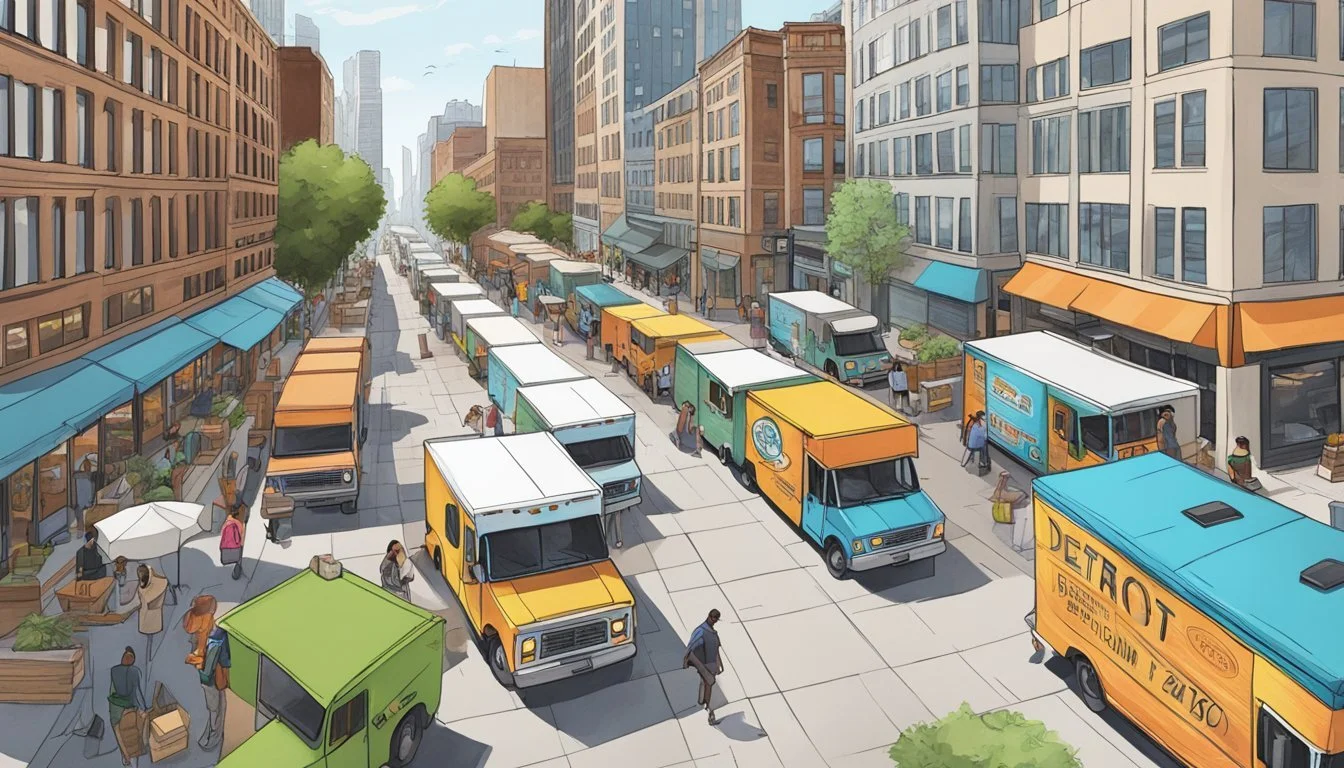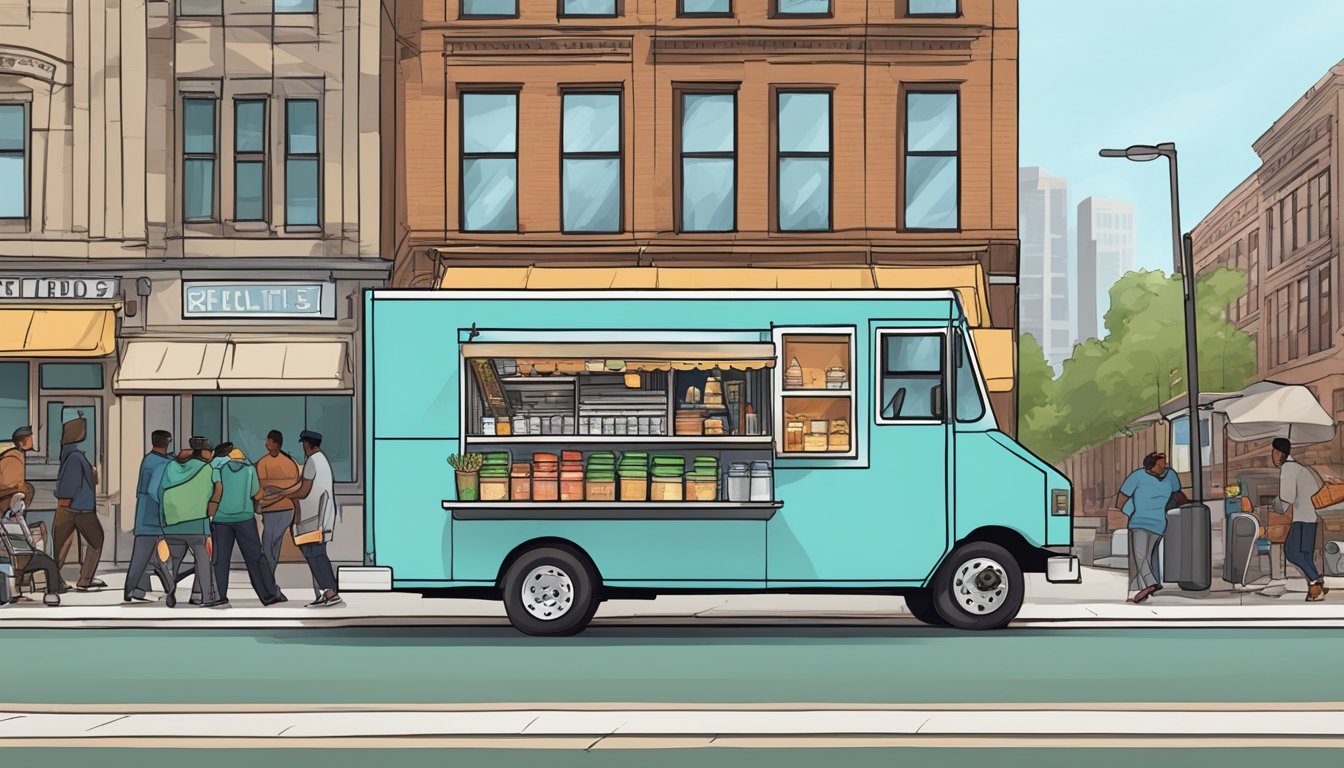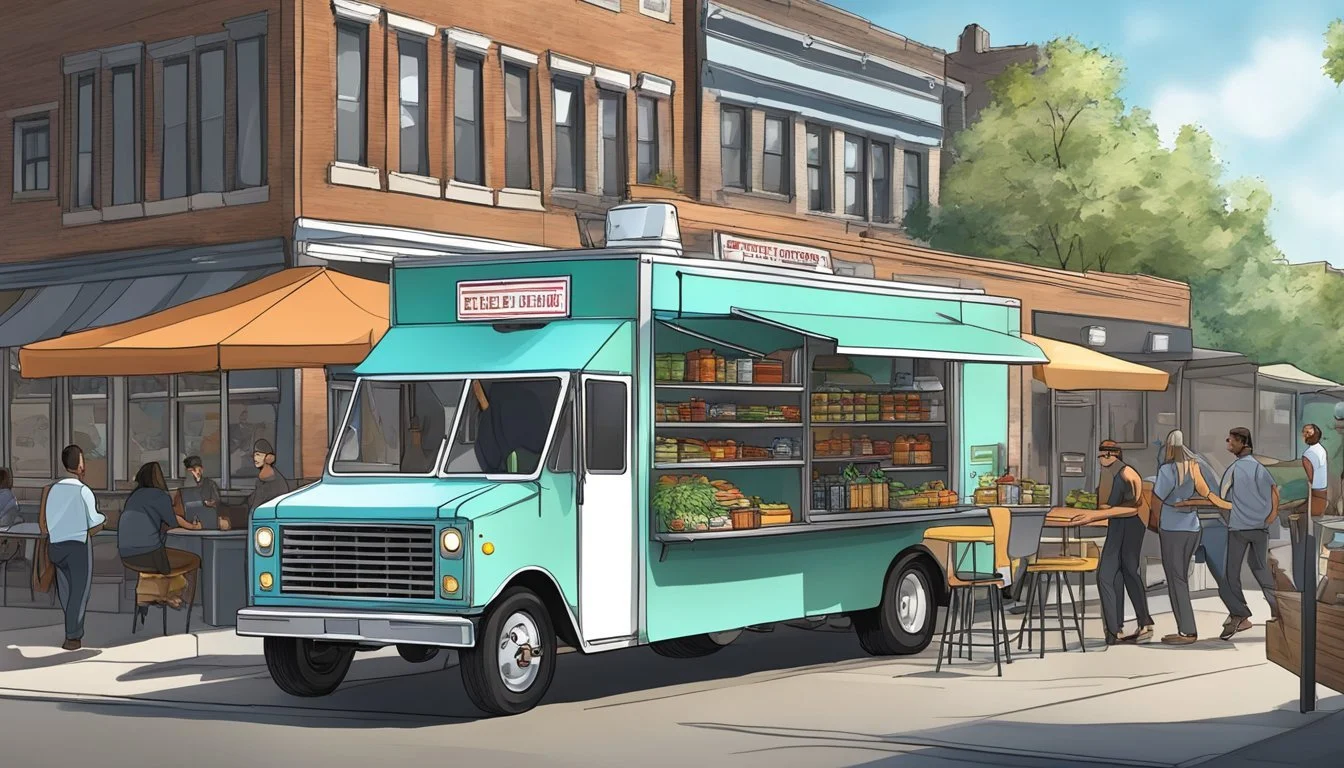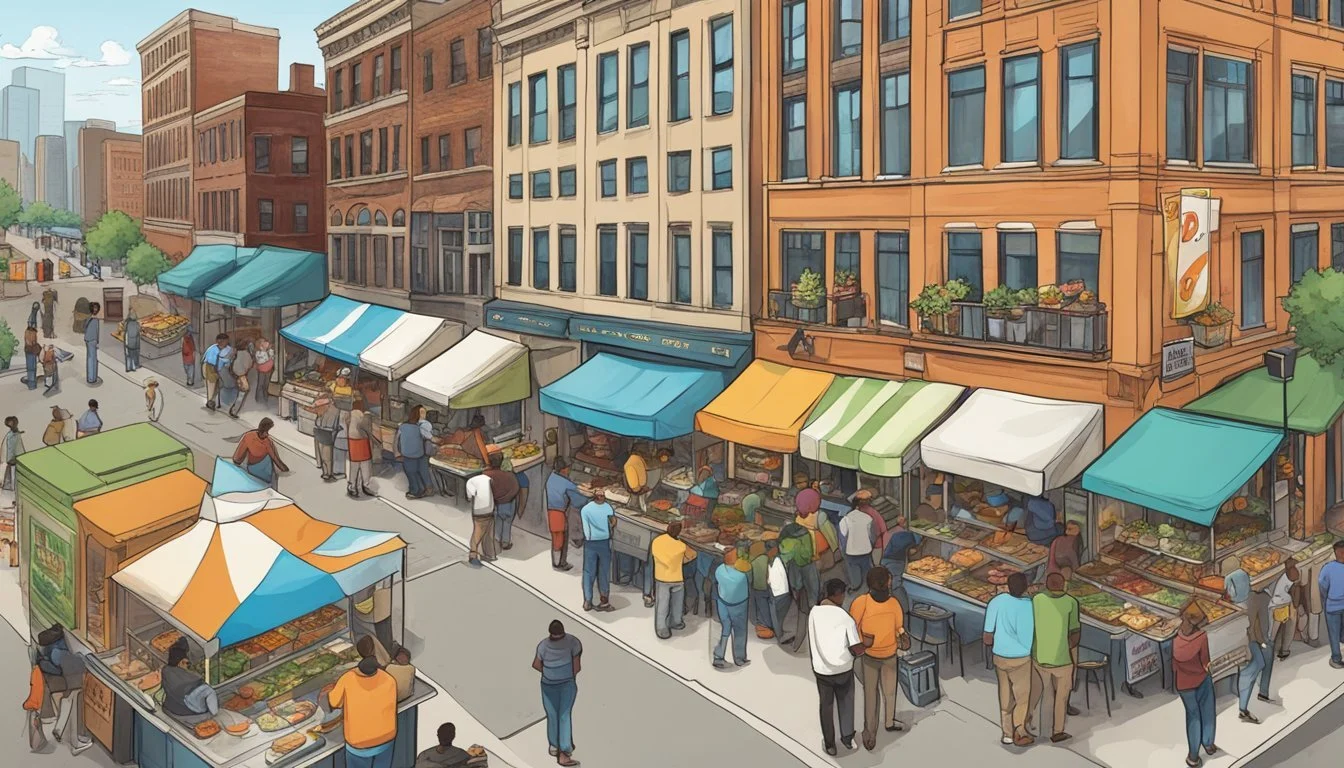Food Truck Laws Detroit, Michigan
Navigating Regulations for Mobile Vendors
Operating a food truck in Detroit, Michigan, entails navigating a set of specific laws and regulations designed to maintain public health and safety while also fostering a thriving street food culture. These laws address a variety of concerns, from permitting and licensing to parking restrictions and operating hours. In Detroit, food truck operators must adhere to the guidelines set forth by the City of Detroit's Buildings, Safety Engineering, and Environmental Department, ensuring they meet the standards for food safety and vendor conduct.
Michigan Food Law defines mobile food establishments and specifies the requirements necessary to run such operations. In Detroit, food trucks are prohibited from vending between 11 PM and 5 AM and must vacate their location by midnight according to local ordinances. The regulations are put in place not only to regulate the food service industry but also to consider the impact on local neighborhoods and communities.
For entrepreneurial chefs and small business owners, food trucks offer a unique avenue for serving Detroit's diverse populace. However, compliance with local laws is crucial. Ensuring the proper licenses and permits are obtained, and regulations are followed allows these mobile eateries to legally and successfully operate within the city limits. As each city has its nuances in regulation, staying informed and up-to-date with Detroit's specific requirements is a must for any food truck operator.
Understanding Detroit's Food Truck Regulations
Navigating the regulatory landscape is essential for food truck operators in Detroit. Adherence to city codes and licensing mandates is crucial for legal operation, and understanding these rules ensures food trucks meet local standards.
Codes and Ordinances
In Detroit, food trucks must comply with specific city ordinances that govern street vending. Vendors are prohibited from operating between 11 PM and 5 AM and are required to vacate their location by midnight. The City of Detroit has outlined these regulations to maintain public order and safety.
Licensing Requirements
Acquiring the appropriate licenses is a prerequisite for conducting business. Detroit mandates a plan review application and various licenses for different types of mobile food establishments, including food trucks. The Michigan Food Law is a legislative framework guiding this process, which includes submitting to the Detroit Health Department's Food Safety Section.
Health and Safety Inspections
Regular health and safety inspections are carried out by the Detroit Health Department to ensure compliance with food safety standards. These inspections evaluate numerous factors, including food handling, temperature control, and equipment cleanliness. Food trucks must pass these inspections to retain their operational licenses.
Operating in Designated Areas
Food trucks in Detroit are restricted to specific designated areas, especially in the Central Business District, where zoning laws dictate their operation. These regulations are designed to avoid congestion and ensure access to businesses. Commissaries are often utilized by mobile food vendors as prep and storage facilities, which also fall under specific zoning regulations. Parking and operation must always comply with the Detroit City Council enacted ordinances.
Starting Your Food Truck Business in Detroit
To successfully start a food truck business in Detroit, prospective owners must navigate a series of legal requirements and business considerations. These include comprehensive planning, securing appropriate licenses, addressing vehicle and menu specifics, and establishing a commissary partnership.
Creating a Business Plan
A well-crafted business plan is the first crucial step to launching a food truck in Detroit. It should outline the business's goals, operational strategies, and financial projections. Prospective owners need to consider their target market, their menu's uniqueness, and how they will differentiate themselves from the competition.
Securing Licenses and Permits
Securing the correct licenses and permits is essential. In Detroit, operators must obtain a Mobile Food Establishment license, which involves a plan review process to ensure the truck meets all health and safety standards. The fire department must inspect the truck for safety compliance. There will be a license fee associated with obtaining the necessary permits, and operators may also need an Employer Identification Number (EIN) if they intend to hire employees.
Vehicle and Menu Considerations
The vehicle must meet specific requirements detailed by local regulations. It's necessary to ensure the truck is equipped to handle the menu items being served, following local codes regarding grease and sanitation. The equipment required may vary significantly depending on the menu complexity and the food preparation processes.
Finding a Commissary
Finally, Detroit food truck operators will typically need to partner with a commissary, which offers a space to store and prepare food safely. This is a regulatory requirement, and it helps in maintaining food safety while reducing the risk of foodborne illnesses. The relationship with the commissary must also be documented as part of the licensing process.
Location and Placement Strategies
In Detroit, Michigan, food truck operators must navigate the city's regulations to find optimal locations that attract customers while complying with the law. Strategic placement involves targeting areas with high pedestrian traffic and understanding restrictions to avoid fines and maximize earnings.
High-Traffic and Popular Areas
When considering placement, food trucks should aim for high-traffic areas where footfall is significant. Locations like Midtown and Downtown Detroit are prime spots with an influx of people, especially during business hours and weekends. The Cultural Center, known for its museums and galleries, and bustling streets such as Cass Avenue, Brush Street, and Forest Avenue can become lucrative spots. Also, Third Avenue and Howard Street often see plenty of potential customers.
Avoiding Restricted Zones
While vibrant streets like Warren Avenue, Beaubien Street, Jefferson Avenue, and Atwater Street can be tempting, food trucks must abide by rules prohibiting vending within 200 feet of a business that sells similar products unless given written consent. It is essential they are aware of restricted zones near these locations and rules put forth by the Detroit Food Truck Ordinance to ensure they operate legally.
Events and Public Spaces
Events and public spaces can provide excellent opportunities for food trucks to capitalize on large gatherings. Food trucks are frequently welcomed at events around John R Street, near Hendrie Street, and in the vicinity of Palmer Park. Additionally, areas along the Detroit River and near I-75 may serve as strategic points for vending, as long as they comply with regulations regarding Mobile Food Establishments and obtain the proper permits for event participation.
Compliance with Food Truck Laws
For food truck operators in Detroit, Michigan, compliance is critical to ensure the safety of their customers and the longevity of their businesses. Stringent adherence to regulations set by the city and state, including coordination with the Health Department, maintaining fire safety, and keeping accurate records is essential.
Health Department Coordination
All food trucks must comply with the Michigan Food Law, obtaining a Mobile Food Establishment license if they are a regular operation, or a Special Transitory Food Unit (STFU) license for temporary setups. Coordination with the Health Department begins with a Food Service License Application, which includes a plan review assessing the construction and safety measures for foodborne illness prevention. The Detroit Health Department's Food Safety Unit ensures food trucks provide safe food and operates in a manner that protects public health.
Fire Safety and Inspections
The Buildings, Safety Engineering, and Environmental Department (BSEED) enforces compliance with fire safety standards for food trucks. This includes regular Fire Inspections to check for proper installation and maintenance of cooking equipment and the handling of grease, which can pose a significant fire risk if not managed correctly. Additionally, food trucks that use propane or other flammable agents must have these systems inspected and approved.
Renewals and Record-Keeping
Meticulous record-keeping is a necessity for every food truck operator. This includes renewing their licenses annually with the Health Department to ensure ongoing compliance with the Michigan Food Law. Food trucks must keep records of all Inspections, Complaints, and any issues related to foodborne illnesses. Such diligence not only helps in renewing licenses but is also pivotal if a small business needs to demonstrate compliance or address any legal matters.
Support and Resources for Food Truck Owners
Food truck owners in Detroit, Michigan, can take advantage of a wealth of local resources tailored to assist in business development, compliance with regulations, and integration into the city's vibrant food scene.
Local Organizations and Assistance
Organizations like the Detroit Health Department and Downtown Detroit Partnership provide substantial support to food truck owners. The Detroit Health Department oversees the safety and regulatory compliance of mobile food services. In partnership, the Downtown Detroit Partnership facilitates the integration of food trucks within bustling city areas, promoting food access and equity in Detroit neighborhoods. Additionally, food trucks can become active participants in area events classically hosted in entertainment and sports arena areas, fostering a symbiotic relationship with the city's cultural dynamics.
Detroit Health Department: Regulatory Guidance and Licensing
Downtown Detroit Partnership: Event Participation and Location Permits
Equity and Food Access: Support for serving in underserved neighborhoods
Training and Education Programs
Various programs are available for food truck owners seeking guidance on operating within the city's regulatory framework and tapping into Detroit's cultural centers and small business networks. Training and education programs, often hosted by local business associations, can help new and established owners understand the essentials of food safety, business operations, and the particulars of serving in high-density areas like entertainment districts or during special events.
Food Safety Training: Courses provided by the Detroit Health Department
Business Operations: Workshops on small business management
Cultural Integration: Programs on becoming part of Detroit's diverse cultural center
The resources provided aim not merely for compliance but for the integration of food trucks into the broader tapestry of Detroit's food landscape, encompassing equity in food access and a boost to the local economy through small businesses.
Operating Amidst Special Conditions
In Detroit, Michigan, food truck operators face unique challenges related to environmental, legislative, and health factors. Different seasons and the ongoing changes due to pandemics require an adaptable business approach.
Adjusting to Seasonal Changes
Food truck season in Detroit can be significantly impacted by the changing seasons. Winter months may present hurdles such as harsh weather conditions that not only limit the foot traffic of pedestrians but also pose operational challenges for food trucks on the city's sidewalks. To cope, food trucks may alter locations seeking sheltered spots or adjust their menus to include items more suitable for cold weather.
Conversely, the warm summer and spring months typically see an upswing in foot traffic, leading to increased competition amongst food trucks. Legislation permits food trucks to operate in specific zones; thus, operators must strategically choose their spots to maximize exposure to potential customers while complying with designated restrictions.
Handling Pandemic-related Restrictions
The advent of the pandemic has ushered in stringent legislation and restrictions for food trucks in terms of hygiene and social distancing, influencing how they serve the bustling city's pedestrians. These restrictions often limit the number of customers that can be served at a given time and require adjustments to service methods to ensure customer and staff safety.
Additionally, the shifting nature of pandemic-related legislation necessitates food truck operators to stay informed and quickly comply with new guidelines, which may affect their day-to-day operations. For instance, they may need to install barriers or implement contactless payment systems to minimize the risk of virus transmission, thereby protecting both staff and customers while continuing to provide their services amidst these challenging conditions.
Expansion and Diversification
In Detroit's evolving food landscape, food truck laws have adapted to foster growth and variety within the mobile food sector. This expansion has allowed for a richer array of eating options and collaborations, directly benefiting both food truck operators and the wider community.
Exploring Additional Revenue Streams
Food truck operators in Detroit have begun to explore additional revenue streams to bolster their businesses. Liquor licenses have become a coveted asset for some food trucks, particularly those looking to participate in evening events or to pair gourmet offerings with alcoholic beverages, hence enhancing their appeal to adult patrons. Meanwhile, new establishments have sought out food trucks as a means to add diversity to their offerings without the commitment of a brick-and-mortar expansion.
Collaborating with Local Businesses
Collaborations between food trucks and established local businesses, including restaurants and convenience stores, promote mutual growth. These partnerships may involve food trucks operating within or near the premises of a business, thus drawing in a shared customer base. The onset of the pandemic saw an increase in such cooperative approaches, leveraging the mobility of food trucks to reach customers when traditional food establishments faced restrictions. Vending areas have expanded beyond downtown into residential neighborhoods, also noted by the Detroit Free Press, enabling food trucks to function as small mobile businesses that can provide convenient access to food options where they might have been scarce.
By adapting to ever-changing circumstances and seeking innovative intersections with various facets of Detroit's vibrant food scene, mobile food businesses are carving out a significant niche within the city's gastronomic tapestry.






